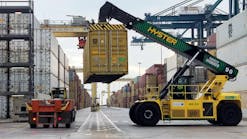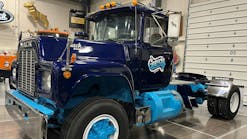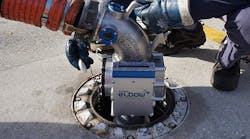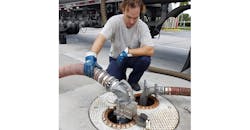Berrys Technologies recently introduced the Midas Elbow, an anti-cross drop device that replaces regular fuel delivery fittings, creating an anti-cross-contamination system Berrys says is portable, easy-to-use and affordable.
The company said the system can save fuel carriers thousands of dollars annually in compensation to retailers and consumers.
A system uses an RFID tag in the spill bucket to communicate the fuel grade to the Elbow, then the Elbow reads the fuel type being delivered into a gas station’s bulk storage tank, helping avoid contamination from gas, diesel, kerosene and water.
If the correct fuel is dropped, the Midas Elbow valve allows the fuel drop to continue. If the wrong fuel is delivered, the Midas Elbow remains closed, disallowing the wrong fuel from being dropped, Berry said.
“The device also sounds an audible alarm and sends a readable message to the driver alerting him or her that there was a problem with the fuel choice, allowing the driver to rectify the error,” Berrys maintained. “No incorrect fuel ever reaches the UST tank. The cross-contamination accident is avoided.”
The original Midas system has been installed for nearly a decade in Europe and the UK, and has been successful under extreme temperature conditions in Russia (-30 degrees), as well as in the deserts of the Middle East, where the temperatures regularly top 100 degrees, Berrys said. The second-generation Midas Elbow was modified to suit the North American market, incorporating the latest technology in a compact and totally portable product.
Tanker drivers carry the portable elbows in their truck, which once hooked to the fill position in the spill bucket and hose leading to the fuel tank, sense which fuel is the correct one for dropping into which UST. The RFID tag permanently installed in the spill bucket continues communicating with the Midas Elbow passing on any information the tag has had written onto it, such as the tank number and retailer or the site address. The Midas Elbow has the time, date and year information stored in its non-volatile memory, and the customer can determine what other information, however basic or dense, they choose to record and store. All data will be downloadable via a smartphone app coming soon, Berrys said.
Drivers can carry two Midas Elbows on their truck and easily connect the system to any bulk fuel storage tank meaning a Midas Elbow isn’t needed for every tank-filling point, making it a very cost-effective solution.
“The Midas system has been a major player in Europe and the UK for years and we are very excited to bring its benefits to the US Market,” said Martin Berry, CEO of Berrys Technologies US. “We’ve received our patents and after passing rigorous testing, we also received our all-important UL-certifications, UL1203, UL429, as well as IECex and Atex certifications and orders are beginning to flow in.
“The Midas Elbow not only prevents a lost-fuel problem, but protects the retailer, consumer and the carrier’s reputation and brand. Drivers love it for its ease of use and the responsibility it takes off their shoulders. Insurers are happy with fewer claims to pay and station owners are glad there is no downtime for the installation of complex equipment, nor for contamination accidents.”
With drivers having multiple deliveries to complete every day, fatigue and distraction can lead to human error. Having only faded color-coded lids and frames to rely upon to choose the correct UST, mistakes are bound to happen, Berrys said. Those mistakes can cost the carrier thousands of dollars in compensation both to the retailer and the consumers who received the wrong fuel.
The Midas Elbow can help rectify the situation.
“The biggest culprit is the accidental delivery of diesel fuel into the gasoline receiving tanks or vice versa,” said Kip Hart, CEO of Hart Industries, the exclusive distributor of Berrys Technologies’ Midas Elbow in the United States. “This type of mishap can cost thousands of dollars.
“The delivering carrier could wind up paying not only for the contaminated fuels delivered to the retailers, but additionally, the costly repairs for damaged engines in the vehicles that may have filled up with the contaminated fuels.”
Other related costs can occur when the wrong fuel has found its way into the wrong UST tank. These expenses may include pumping out contaminated tanks, replacing the incorrect fuel and disposing of the contaminated fuel. The retailer may also require restitution of any revenue they will lose during the time the station is down.
Until now, avoiding such cross-contamination issues was an expensive proposition, Berrys said. Other industry leaders make use of multiple component systems that require operators to upgrade fittings, buckets and trailers. And then there is still the problem of human error. Competitors’ systems still rely on the driver to make decisions, which, unfortunately, sometimes means making bad ones.
“Unlike much more expensive and complex systems that have tried to address the cross-drop contamination problem, the Midas Elbow not only stops human error in its tracks, (it) is affordable, so that whether the carrier is an independent with one tanker or a fleet of hundreds, this solution is accessible and there is no down time,” Berry said.
For more information about Berrys' Midas Elbow, call 407-413-1020, email [email protected] or visit berrysus.com.











